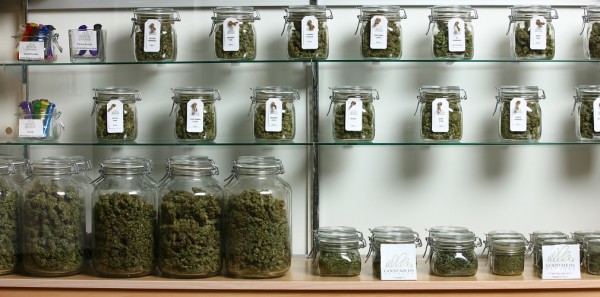

The Department of Veterans Affairs will not conduct research into the effects of medical cannabis on post-traumatic stress disorder and chronic pain — some of the very ailments veteran patients rely on the drug to treat.
In a Dec. 21 letter to Minnesota Democrat Rep. Tim Walz, VA Secretary David Shulkin said that the department is unable to research medical cannabis due to federal restrictions. “VA is committed to researching and developing effective ways to help Veterans cope with post-traumatic stress disorder and chronic pain conditions.
“However, federal law restricts VA’s ability to conduct research involving medical marijuana, or to refer veterans to such projects,” he added.
Your browser cannot view this PDF.You can click here toview the PDF.
VA press secretary Curt Cashour expanded on Shulkin’s explanation in an email to Task & Purpose this afternoon: Conducting research into medical cannabis at the VA would “involve interactions with a number of federal entities” from the Food and Drug Administration, Health and Human Services, National Institute of Health, National Institute of Drug Abuse, and the Drug Enforcement Administration.
“Requirements include review of an investigational new drug application and approval of the research protocol by the FDA; an investigator registration and site licensure by the DEA; and obtaining the medical drug through NIDA and the nationally approved medical marijuana production laboratory,” Cashour said in an email.
In other words, it’s not illegal, but there’s a lot of red tape to get through.
Related: VA Doctors Are Now Cleared To Talk About Medical Marijuana With Patients »
Shulkin’s letter was a response to Walz and nine other Democrats from the House Committee on Veterans Affairs who submitted a letter in October asking whether the VA would commit to conducting research into the effects of medical cannabis on post-traumatic stress disorder and chronic pain, and if not, what barriers stood in the way of that research.
Walz’s office released both Shulkin’s Dec. 21 letter, as well as another letter dated Jan. 16, again calling for the VA to outline “any and all external and internal barriers in the pursuit of research” into medical cannabis.
Your browser cannot view this PDF.You can click here toview the PDF.
“VA’s response not only failed to answer our simple question, but they made a disheartening attempt to mislead me, my colleagues, and the veteran community in the process,” Walz wrote. “They claimed, without citing any specific law, that VA is restricted from conducting research into medical cannabis, which is categorically untrue. They also go on to make additional excuses while demonstrating a severely limited understanding of existing medical cannabis research in the process.”
Shulkin’s confirmation that the VA will not pursue research on the potential benefits of medical marijuana for veterans is a huge setback for advocates who see the drug as a potential alternative to a pill-heavy treatment plan, for ailments like chronic pain — which affects half of all patients enrolled in the Veterans Health Administration
Twenty-nine states, plus the District of Columbia, Puerto Rico, and Guam have legalized medical cannabis programs, and veterans organizations have been pushing for research into the drug as a possible treatment option for ailments such as PTSD and chronic pain, and as an alternative to highly addictive opioids.
Cannabis research also has widespread support among veterans and their family members, with a November 2017 American Legion phone survey reporting that 92% of veteran households support research into the efficacy of medical cannabis in treating mental and physical health conditions.
The news that the VA will not conduct research into medical cannabis comes just a month after the department broadened its guidelines for patients in state-legal medical pot programs to openly discuss their cannabis use with VA physicians — something never officially barred but not widely disseminated or understood.
At this time, it’s unclear how the department’s stance on marijuana research will impact how VA doctors speak with patients about the drug’s use.
“I do not understand how VA can allow VA doctors to discuss medical cannabis with veterans while at the same time refusing to conduct research into medical cannabis’s effects on veterans,” Walz told Task & Purpose in an email. “To me, these mixed signals are counter intuitive and irresponsibly put veterans’ health at risk.”
